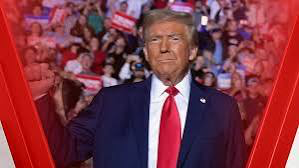U.S. President-elect Donald Trump has urged his supporters to help the Democratic Party recover from post-election financial strains, recommending that they consider donating to assist with the Democrats’ reported financial struggles.
In a post on X, Trump noted that despite record fundraising efforts during the 2020 Presidential Election, the Democrats are left with limited funds after their loss.
“I am very surprised that the Democrats, who fought a hard and valiant fight in the 2020 Presidential Election, raising a record amount of money, didn’t have lots of $’s left over. Now they are being squeezed by vendors and others. Whatever we can do to help them during this…”
He expressed surprise over the shortfall, saying, “I am very surprised that the Democrats, who fought a hard and valiant fight in the 2020 Presidential Election, raising a record amount of money, didn’t have lots of $’s left over. Now they are being squeezed by vendors and others.”
Trump called for unity in the aftermath of the divisive election, adding, “Whatever we can do to help them during this difficult period, I would strongly recommend we, as a Party and for the sake of desperately needed UNITY, do. We have a lot of money left over in that our biggest asset in the campaign was ‘Earned Media,’ and that doesn’t cost very much. MAKE AMERICA GREAT AGAIN!”
Reports indicate that Kamala Harris’s campaign concluded with approximately $20 million in debt, according to sources cited by Politico’s California bureau chief, Christopher Cadelago.
Despite raising more than $1 billion, Harris ended with only $118 million in her campaign funds by mid-October.
Harris, the Democratic nominee in the November 5 election, set new fundraising records with her campaign and affiliated Super PACs, which collectively raised $2.3 billion, spending $1.9 billion.
In contrast, Trump’s campaign raised and spent slightly less, with $1.8 billion raised and $1.6 billion spent.
Ajay Jain Bhutoria, a prominent fundraiser for Harris, explained that while her campaign achieved significant financial backing, it struggled to resonate with key voter demographics.
Bhutoria noted that the campaign’s reliance on high-profile endorsements and celebrity events could not close the widening gap between the Democratic Party and middle-class Americans, who faced increasing costs for essentials like food, rent, and healthcare.

